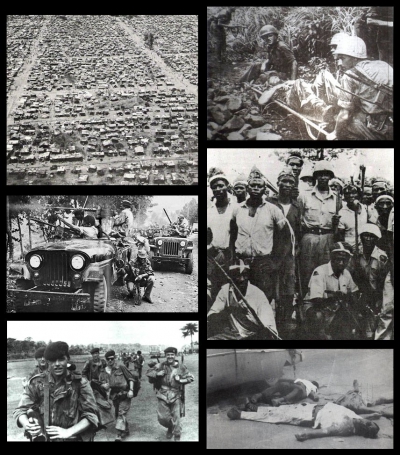The State of Katanga also sometimes denoted as the Republic of Katanga, was a breakaway state that proclaimed its independence from Congo-Lopoldville on 11 July 1960 under Moise Tshombe, leader of the local Confdration des associations tribales du Katanga (CONAKAT) political party. The new Katangese state did not enjoy full support throughout the province and was constantly plagued by ethnic strife in its northernmost region. It was dissolved in 1963 following an invasion by United Nations Operation in the Congo (ONUC) forces, and reintegrated with the rest of the country as Katanga Province.
The Katangese secession was carried out with the support of Union Minire du Haut Katanga, an Anglo-Belgian mining company, and a large contingent of Belgian military advisers. An army the government called the Katanga Gendarmerie, raised by the Tshombe government, was initially organised and trained by Belgium and subsequently, mercenaries of various nationalities.
The Congo Crisis (French: Crise congolaise) was a period of political upheaval and conflict between 1960 and 1965 in the Republic of the Congo (today the Democratic Republic of the Congo). The crisis began almost immediately after the Congo became independent from Belgium and ended, unofficially, with the entire country under the rule of Joseph-Désiré Mobutu. Constituting a series of civil wars, the Congo Crisis was also a proxy conflict in the Cold War, in which the Soviet Union and the United States supported opposing factions. Around 100,000 people are believed to have been killed during the crisis.
A nationalist movement in the Belgian Congo demanded the end of colonial rule: this led to the country's independence on 30 June 1960. Minimal preparations had been made and many issues, such as federalism, tribalism, and ethnic nationalism, remained unresolved. In the first week of July, a mutiny broke out in the army and violence erupted between black and white civilians. Belgium sent troops to protect fleeing whites. Katanga and South Kasai seceded with Belgian support. Amid continuing unrest and violence, the United Nations deployed peacekeepers, but UN Secretary-General Dag Hammarskjöld refused to use these troops to help the central government in Léopoldville fight the secessionists. Prime Minister Patrice Lumumba, the charismatic leader of the largest nationalist faction, reacted by calling for assistance from the Soviet Union, which promptly sent military advisers and other support.
The involvement of the Soviets split the Congolese government and led to an impasse between Lumumba and President Joseph Kasa-Vubu. Mobutu, in command of the army, broke this deadlock with a coup d'état, expelled the Soviet advisors and established a new government effectively under his own control. Lumumba was taken captive and subsequently executed in 1961. A rival government of the "Free Republic of the Congo" was founded in the eastern city of Stanleyville by Lumumba supporters led by Antoine Gizenga. It gained Soviet support but was crushed in early 1962. Meanwhile, the UN took a more aggressive stance towards the secessionists after Hammarskjöld was killed in a plane crash in late 1961. Supported by UN troops, Léopoldville defeated secessionist movements in Katanga and South Kasai by the start of 1963.
With Katanga and South Kasai back under the government's control, a reconciliatory compromise constitution was adopted and the exiled Katangese leader, Moïse Tshombe, was recalled to head an interim administration while fresh elections were organised. Before these could be held, however, Maoist-inspired militants calling themselves the "Simbas" rose up in the east of the country. The Simbas took control of a significant amount of territory and proclaimed a communist "People's Republic of the Congo" in Stanleyville. Government forces gradually retook territory and, in November 1964, Belgium and the United States intervened militarily in Stanleyville to recover hostages from Simba captivity. The Simbas were defeated and collapsed soon after. Following the elections in March 1965, a new political stalemate developed between Tshombe and Kasa-Vubu, forcing the government into near-paralysis. Mobutu mounted a second coup d'état in November 1965, taking personal control of the country. Under Mobutu's rule, the Congo (renamed Zaire in 1971) was transformed into a dictatorship which would endure until his deposition in 1997.

1960Jul, 11
Congo Crisis: The State of Katanga breaks away from the Democratic Republic of the Congo.
Choose Another Date
Events on 1960
- 17Mar
Bay of Pigs Invasion
U.S. President Dwight D. Eisenhower signs the National Security Council directive on the anti-Cuban covert action program that will ultimately lead to the Bay of Pigs Invasion. - 21Apr
Rio de Janeiro
Brasília, Brazil's capital, is officially inaugurated. At 09:30, the Three Powers of the Republic are simultaneously transferred from the old capital, Rio de Janeiro. - 9May
Combined oral contraceptive pill
The Food and Drug Administration announces it will approve birth control as an additional indication for Searle's Enovid, making Enovid the world's first approved oral contraceptive pill. - 4Jul
Flag of the United States
Due to the post-Independence Day admission of Hawaii as the 50th U.S. state on August 21, 1959, the 50-star flag of the United States debuts in Philadelphia, almost ten and a half months later (see Flag Act). - 29Oct
Muhammad Ali
In Louisville, Kentucky, Cassius Clay (who later takes the name Muhammad Ali) wins his first professional fight.

 English
English  español
español  français
français  português
português  русский
русский  العربية
العربية  简体中文
简体中文 